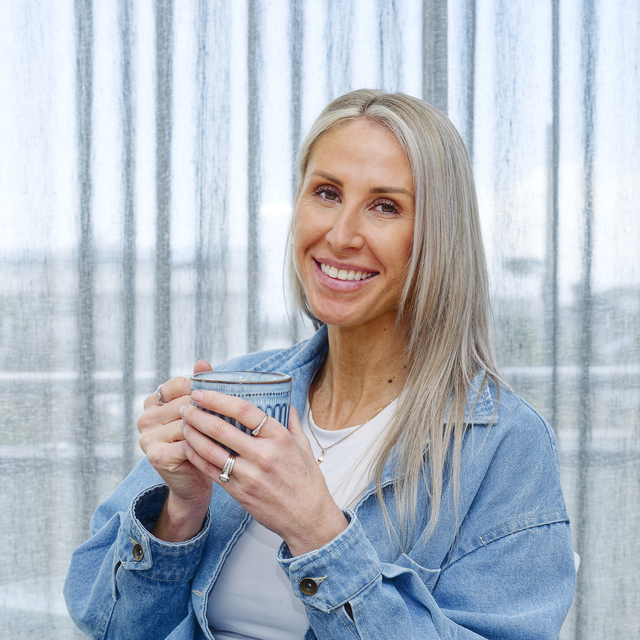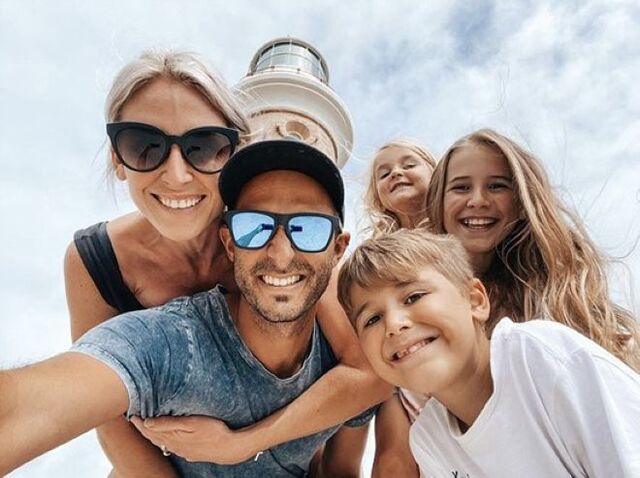Torquay’s Chloe Farrugia suffered two strokes in 2014. She speaks with Jena Carr during National Stroke Week about her journey and the importance of knowing the signs of a stroke.
If it weren’t for Chloe Farrugia’s husband Grant and children, she possibly would not be able to walk or talk and may not be here today.
It was back in 2014, and the then 24-year-old mum was about to host a big party for the AFL grand final, when a stroke would change Chloe’s life.
“Hubby and I went into the bathroom to have some hanky panky before the party and I said, ‘I don’t feel well, like I feel like I’m going to faint’,” she said.
“He went to walk me to bed, but I fell on the floor as my left leg gave way, and I couldn’t feel my left leg, so he lifted me onto the bed and saw my face start to droop on my left side.
“I thought that I was talking clearly, but I wasn’t, and I was just mumbling, so Grant started to get concerned and called an ambulance straight away.
“I told him not to and said, ‘I just feel like I need to pass out, so leave me alone for a minute and let me pass out’, but he said no and that it was not normal.
“He called the paramedics, and they told Grant over the phone to lift my left arm and see if I could hold it up.
“When he lifted it up, I looked at my hand and realised that I had no control of my body, which was really scary, and when the paramedics came, they thought there was a bleed somewhere.
“They pretty much told my family to say their goodbyes because they didn’t know if I was going to make it or not, but I’m lucky that I made it into hospital and got the medication that I needed.”
Just a month after her first stroke, Chloe was able to take a break from life in rehab at the hospital to go home and spend a day with her kids when she was hit with another stroke.
“Hubby was cooking dinner, so I went and sat on the other side of the bench and started to have tremors on my left side, so we called an ambulance and went back into hospital,” she said.
“They found out that I was having another stroke, so I was rushed in for heart surgery, where doctors found a hole in my heart where the clots were getting up to my brain.
“It wasn’t good for my kids to see this, as it was meant to be a happy day with me coming home and spending the day with my children.”
If two strokes weren’t enough of a challenge, Chloe’s son, who has an autism spectrum disorder, also underwent his own personal and medical challenges.
“We were told that he was going to be mute and at the age of two, we thought he had tonsillitis because he wouldn’t turn his head, but he wasn’t able to tell us that he had a sore throat,” she said.
“After a week of no drinking, eating, or wet nappies, we took him to the children’s hospital, and doctors found a lump on his lymph node.
“They went in to do surgery and a biopsy on the lump, and as they were doing a biopsy on the lump, his throat closed over.
“So, they had to cut half his throat out, intubate and put him in a coma to let it settle and we did about two or three more surgeries after that, which was pretty traumatising.”
Chloe said that what affected her the most during her medical journey was how it affected her children, with her eldest the most impacted.
“My daughter, who was four years old at the time, had a lot of abandonment issues because I went to rehab (for six months) for so long and she couldn’t understand why Mum had left home,” she said.
“Then, when I came home, her brother was in a coma in the children’s hospital, so hubby and I were living in the Ronald McDonald House.
“She just felt like everyone was leaving her and everyone was getting sick, and I want to take all my kids’ pain and for everything to be okay, but sometimes it’s not okay, and you can’t lie to them.
“This still affects her today, and she continues to see a psychologist for separation anxiety and abandonment issues.”
Chloe said National Stroke Week (August 4 to 10) was an important time for everyone to learn about the signs of a stroke.
“If my husband did not know the signs of Face, Arms, Speech and Time (F.A.S.T.), I wouldn’t be here today, and my kids would not have a mother,” she said.
“I even have a tattoo of F.A.S.T. on my hand, and it’s such a good way to get talking about it with people who see it, so that’s why I got it tattooed.
“I believe everything happens for a reason, and I think I had to have these strokes, which sounds silly, but I believe I had to have them to appreciate life.
“I was a personal trainer, I was healthy and had a good lifestyle, so it just shows that it can happen to anyone, as I did not think it would happen to me.
“A doctor said to me after my strokes that, ‘you may never run with your children again’, and I was like, ‘bugger that, watch me’.
“I asked for a mirror because I wanted to get my face back, so every day I’d look at my face, and my husband brought the kids in every day, which was my biggest motivation.
“A few years later, we spent two years travelling Australia in a caravan where we did lots of hiking, and I noticed an hour into a hike that my left leg would get really heavy, so I was prone to tripping over.
“I’m also on blood thinners, so I can’t bump my head otherwise I bleed out, so the stroke still affects me with tiredness, and I can lose my words by the end of the day.”
A stroke occurs every 11 minutes in Australia and attacks 1.9 million of a person’s brain cells per minute when it strikes, according to the Stroke Foundation’s 2024 economic impact of stroke report.
Visit strokefoundation.org.au for more information about National Stroke Week and the F.A.S.T. signs of stroke.










